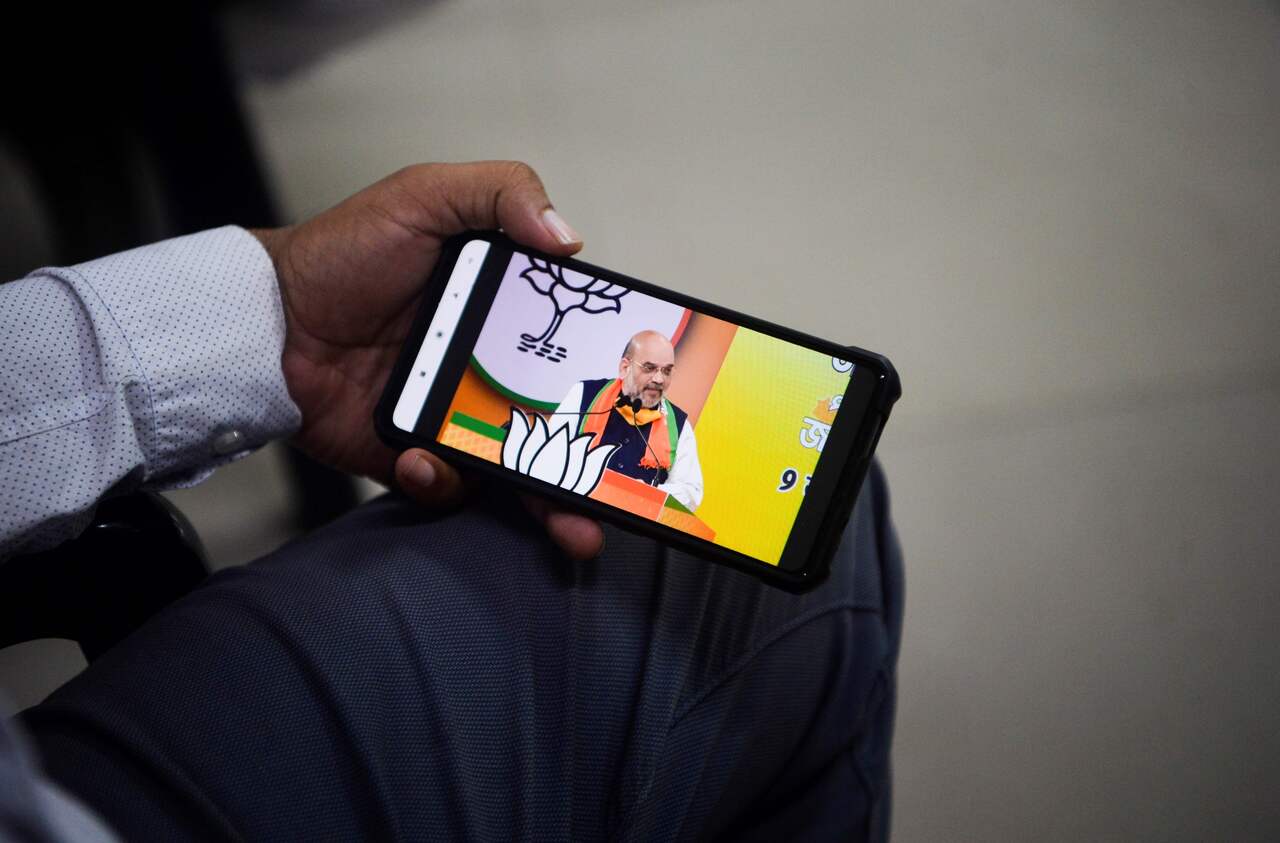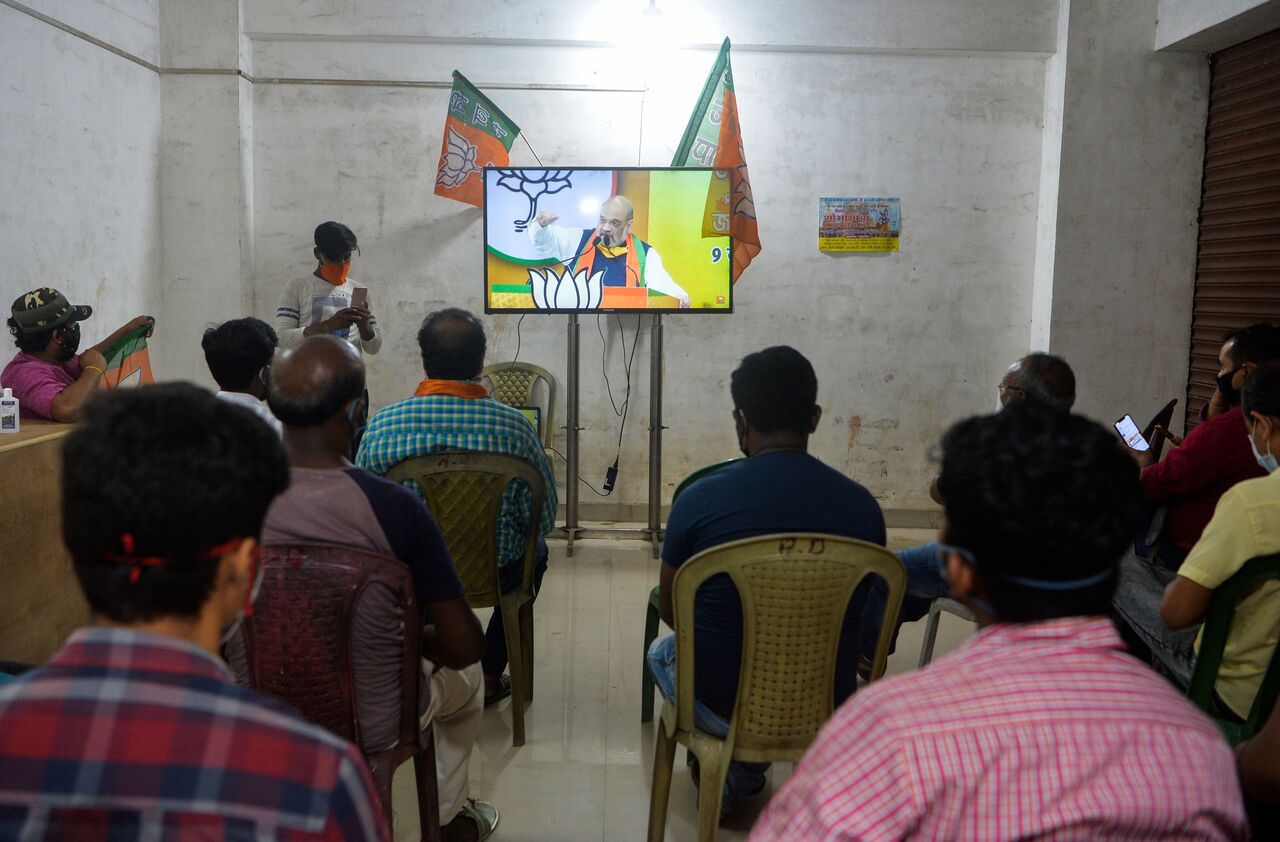India's political parties turn to digital campaigns during coronavirus pandemic
Sign up now: Get ST's newsletters delivered to your inbox

A supporter of Bharatiya Janata Party watches India's Home Minister Amit Shah speak during an online rally in Siliguri, on June 9, 2020.
PHOTO: AFP
Follow topic:
NEW DELHI - In India, massive rallies are at the heart of political campaigning during elections or even otherwise to reach out to supporters or voters.
Amid the coronavirus pandemic, however, political parties are being forced to deepen their digital engagement with voters.
India is the fourth-most affected country in the world, with 297,535 cases.
Federal home minister Amit Shah, India's second-most powerful politician, has held at least three rallies this week as part of a digital outreach to supporters and others to mark the completion of the first year of Prime Minister Narendra Modi's second term in power.
This includes the first one in the central state of Bihar, which is set for elections in three months.
The ruling Bharatiya Janata Party (BJP) alliance, which is in power in Bihar, "will come to power with two-thirds majority in the coming elections in Bihar", vowed Mr Shah in the rally on Sunday relayed over thousands of specially set up LED screens, television sets and smartphones. The YouTube video of the rally has garnered 326,684 views.
The coronavirus pandemic "is an evolving situation. We hope things will go back to normal. Big rallies cannot be 100 per cent replaced. It's the way we have worked for the last several decades and centuries. We Indians love to come together", said Dr Vijay Chauthaiwale, BJP's foreign affairs department in charge. The party plans to conduct 75 virtual rallies to be addressed by different leaders.
"The virtual rally campaign will lead to the Bihar campaign. We don't know by then whether large public meetings will be allowed. If they are not, we will have to use technology."
Indian political parties in recent years have increasingly used digital media, through WhatsApp, YouTube and Facebook, to reach out to voters, supplementing rallies and door-to-door campaigns. Live Indian political rallies can consist of millions of people.
Parties are also constantly in campaign mode, with multiple states going to the polls at different times and for by-elections for parliamentary seats that fall vacant.
India also has 2,599 parties, including eight national parties.
Discussions are going on within parties over the impact of Covid-19 on politics.
"Basically, if you see the pandemic, two things have happened. The reliance of social media on parties has increased, since there was no other option during the pandemic. This has become a compulsion. We have done 350 to 400 video conferencing at different levels - district, regional and state (since the lockdown started in March). I see it going beyond the pandemic. This is going to be the new normal," said Mr Rohan Gupta, social media head of the Congress Party.
He added that the party is planning digital campaigns and reach-outs.
Congress president Rahul Gandhi has also added to the party's digital reach-out by conducting separate interviews, released on social media platforms, on Covid-19's impact on the Indian economy with Nobel laureate Abhijit Banerjee, Indian economist Raghuram Rajan and corporate honcho Rahul Bajaj. The interviews are seen to have had some impact, with national media picking them up.
Congress leader Sushmita Dev, who is from the north-eastern state of Assam, said she is ensuring digital training for party workers in Assam.
"The aim is also to try to gear up digital training. Otherwise suddenly to change grassroots workers and make them digital-savvy may not be possible," she said.
"I mean if the pandemic carries on as it is carrying on, obviously the mode of campaign has to change."

<p>A supporter of Bharatiya Janata Party (BJP) watches India's Home Minister Amit Shah speaking during an online rally on a mobile phone screen in Siliguri on June 9, 2020. (Photo by Diptendu DUTTA / AFP)</p>
PHOTO: AFP
The Election Commission, which postponed elections to the upper house of Parliament due to Covid-19 early this month, has said it will come out with new guidelines if the pandemic persists.
Analysts said that parties at this point had little choice but to embrace digital methods in campaigning.
"In this exceptional time, I think parties will have no choice but to use the virtual method of campaigning. The BJP has a head-start as they were the first ones who accessed this method," said Dr Sandeep Shastri, a political scientist and Pro Vice-Chancellor at Jain University, who noted the Bihar elections would most likely be a virtual election.
"In the short term, parties are going to use digital platforms to campaign. In the long run, when things get back to normal, I suspect traditional methods of campaigning and electioneering will continue to hold sway. It's a time-tested method which politicians are comfortable with and they would see it as their best bet to attract voters."

